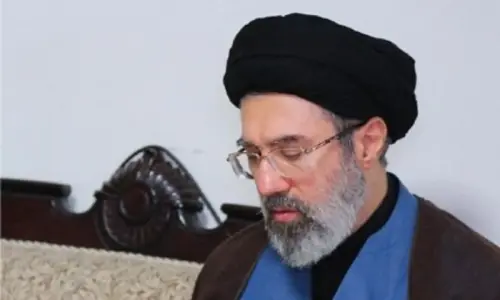
Moin Akhtar, who passed away in Karachi on April 22, was perhaps one of the best known names in comic acting in the subcontinent.
I say this because even the great Indian film legend, Dilip Kumar, once remarked that ‘Moin Akhtar’s great artistry is worth copying.’
But Moin Akhtar was a lot more than just a comic. Beginning his long career as an impersonator, he went on to become a much appreciated stand-up comedian, TV, film and stage actor, talk-show host and then ultimately, going back to doing impersonations.
Surprisingly, not much is available on the man’s life in terms of a biography or a detailed study of this prolific artiste, even though he remained to be the country’s leading comic talent ever since the 1970s.
But Moin Akhtar’s gradual ascend towards stardom and legendary status was also wrought with some devastating failures that took a toll on the man’s health.
He arrived onto the scene at a time when Pakistan, like the rest of the world, too was about to enter a period in the 1960s when urban youth had begun to question the materialism and conservative politics of their parents and were demanding more breathing space to practice their new artistic and political ideas.
Moin Akhtar’s rise was not rapid. His fame grew through word-of-mouth, especially on his home turf in Karachi.
He had been impersonating his teachers and famous Pakistani film actors in school when all of a sudden he was called up by the organisers of a Pakistan Day event at a club in Karachi in 1966. He was just 16 years old.
When his turn came to perform on stage, he did what he was already doing in school. But this time, he added a new act to his impersonation repertoire – that of the famous Pakistani film actor, Mohammad Ali.
Ali had been popular for his loud emotional scenes and a booming voice, and when Moin Akhtar impersonated and mimicked all this to perfection (also adding his own twists and bits), the crowd at the event is said to have erupted in laughter. They had never seen or heard anything like this.
Word about Moin Akhtar’s antics spread and he soon became a popular draw at ‘variety shows’ at universities, colleges and parties.
It is also interesting to note that even though Pakistan’s campuses in the late 1960s had begun to vibrate with fiery uprisings against the Ayub Khan dictatorship, Moin Akhtar mostly kept his act apolitical, concentrating on mimicking and revolving his skits around famous film personalities.
Although he managed to make a modest living doing such shows, his first big break came when in 1970, a 20-year-old Moin Akhtar was invited to perform at the time’s most popular primetime stage show on Pakistan Television (PTV).
Called the ‘Zia Mohyeddin Show’ and hosted by the now famous intellectual Zia Mohyeddin, Moin Akhtar left the audience in stitches when he mimicked the voices of those who had presented PTV’s special transmission during the country’s first democratic elections in 1970.
This was also one of the first few occasions he had come face-to-face with Anwar Maqsood.
Anwar Maqsood had been working as a scriptwriter for the show, but would go on to became a famous satirist and struck a celebrated abiding partnership with the comic genius.
But all this would shape up a decade later. After his successful stint on the ‘Zia Mohyeddin Show,’ Moin Akhtar became a permanent fixture on PTV, even going on to host his own show called ‘Monday Kay Monday.’
Surprisingly, not many acting offers came his way from either TV or film. He continued working as a mimic and impersonator but got a career boost when in 1973, he pulled off a hugely successful show at Karachi’s famous Beach Luxury Hotel where apart from exhibiting his highly improvised impersonation of the time’s famous film stars, he also began impersonating the cultural idiosyncrasies of the many different ethnicities that resided in Pakistan.
It is said that he was one of the first Pakistani comics to do so, an act that would successfully be carried forward by the likes of famous PTV comics, Majid Jehangir, Ismail Tara, Umar Sharif and Liaquat Soldier.
As Moin Akhtar maintained his presence in the public eye as a young comic through various shows on PTV, his main income came from doing private shows for multinationals and colleges.
However, though still ignored by PTV for his acting potential, in 1975 Moin Akhtar finally got an offer to work in a film.
By the mid-1970s the Pakistan film industry had begun to hit a peak, producing an average of 200 films a year (mostly in Urdu, but also in Punjabi, Gujrati, Sindhi and Pashtu).
The film that Moin Akhtar appeared in was called ‘Tajdar,’ and his role of a typical Lollywood maskhara (jester), could not save the film from being a flop. But the failure didn’t stop Moin Akhtar’s ascendancy to stardom.
During the lack of acting offers from TV and film, Moin Akhtar continued to brush up and fatten his mimicry and hosting skills, and he continued to be a popular draw at private events and club shows, also doing his bit on various PTV shows.
He had also been working in commercial theatre. This form of theatre, over which men like Umar Sharif would rule, was still in its infancy.
Luck seemed to have bypassed him again when in 1978 young director Shoaib Mansoor (who would go on to become a prominent TV and film director), began casting actors for a comedy skit show on PTV.
Moin Akhtar should have been an automatic choice, but Mansoor and the show’s scriptwriter, Anwar Maqsood, instead went for relatively unknown stage actors from Karachi, such as Majid Jehangir, Ismail Tara and Zeba Shahnaz. Some like Sakhi Kamal were studying at the University of Karachi and were also politically active there.
Nevertheless, the show, ‘Fifty-Fifty’ was an instant hit. Inspired by the more sophisticated satire show, Shoaib Hashmi’s ‘Such Gup’ (1973-76) – that had been banned by the new military dictatorship in 1977 – ‘Fifty-Fifty’ mixed sophisticated wit with populist humour, parodying the bureaucracy, ethnic idiosyncrasies, the declining standards of the film industry and PTV itself. It ran from 1978 until 1984.
It succeeded in swimming through even the most repressive censorship laws imposed by the Zia dictatorship.
Moin Akhtar’s destiny could have turned out to be quite different had Anwar Maqsood not quit the ‘Fifty-Fifty’ team after experiencing a fall-out with its director and actors in 1981.
As Ismail Tara and Majid Jehangir took over the writing duties of ‘Fifty-Fifty,’ Anwar Maqsood went on to script and appeared on a series of his own shows (also on PTV) such as ‘Show Time,’ ‘Shoshah,’ ‘Silver Jubilee,’ etc.
For these he chose two central comedians, Moin Akhtar and Bushra Ansari. It was during these shows that Moin Akhtar really blossomed into a diversified comic.
The duo played a number of fictitious characters, mouthing witty scripts jotted down by Anwar Maqsood, who too became famous for successfully dodging the censors with tongue-in-cheek remarks that were actually taunts aimed at the Zia regime and its overbearing moralities.
This was also the first time Moin Akhtar saw himself doing socio-political scripts. Slowly but surely, he was finally emerging from his status as a cult favorite and onto the mainstream as a versatile comic.
The 1980s had been rather fruitful. Moin Akhtar had risen from being a cult star and master mimic to becoming a regular skit actor on various successful Anwar Maqsood projects.
And even though he still did not manage to get regular work as an actor, he had begun to venture into the lucrative comedy theatre scene that had begun to grow in Karachi and Lahore.
Nevertheless, after the demise of the Ziaul Haq dictatorship and the return of democracy in Pakistan in 1988, three performances by Moin Akhtar (between 1988 and 1993) finally handed him the stardom his talents had always promised and deserved.
First, it was his role in a wonderfully done comedy play on PTV called, ‘Eid Train.’ Aired on the night of the first day of Eid in 1989, it captured Moin Akhtar playing his now trademark character of a loudmouthed, straight-talking (but skinny) Karachiite. The play was a huge hit.
Then there was his laudable performance as an aged writer in a long-play (for PTV), penned by Anwar Maqsood called ‘Half-Plate,’ in which Moin Akhtar plays an old writer who is suffering from a financial crises but refuses to take up his ancestral profession of a kabaabchi (cook).
Starring alongside Moin Akhtar in the play was the great actress, late Khalida Riyasat and the fidgety late Jamshed Ansari. Incidentally, the fourth main actor of the play, the versatile Latif Kapadia, too is no more in this world.
But perhaps the most well-known acting performance from Moin Akhtar was a 1993 play on PTV called ‘Rozy.’
Moin Akhtar was now dishing out a series of great acting performances, as if making up for the all those times his acting skills were ignored. His performance in ‘Rozy’ in this respect saw him hit a peak.
Written by playwright and journalist Imran Aslam, ‘Rozy’ was an ambitious adaptation of Dustin Hoffman’s famous Hollywood hit, ‘Tootsie.’
‘Tootsie’ shows a struggling actor dressing up as a woman to get a part in a soap opera.
Aslam took the plot of ‘Tootsie’ and wittily turned it into a statement against the kind of harassment women face in the workplace.
Moin Akhtar intensely played the role of the struggling angry-young-actor who dons make-up and women’s attire to land a part in a TV serial.
Moin Akthar had finally mushroomed into a star performer. The only other Pakistani comic that dared to be compared to his caliber was Umar Sharif, who too had broken out from his cult status and gained mainstream popularity, mainly through commercial theatre.
But Umar’s comedy was more populist, rapidly using Karachi’s street lingo and imagery, whereas Moin Akhtar still kept a middle-class sensibility about his acts.
Nevertheless, when Umar directed, scripted and acted in his own film in the early 1990s, Moin Akhtar followed suit.
Umar’s film became a box-office hit, and Moin Akhtar, fresh from his successful acting exploits on TV, invested heavily in his own film called ‘Mr.K2.’
Unfortunately the film turned out to be a financial and critical disaster. Friends suggest that this colossal failure took a heavy toll on the comic genius who was also a heavy-smoker and loved to stay up nights with friends and colleagues.
A reckless and unhealthy lifestyle coupled by his workaholic nature and the failure of his film venture led him to suffer a heart attack. He got a by-pass done in 1997 but returned to regain what he had lost.
He began hosting celebrity shows, but it was Anwar Maqsood’s satirical talk-show, ‘Loose Talk,’ that brought him back into the limelight.
A parody of BBC’s ‘Hard Talk,’ Anwar Maqsood would play Pakistan’s version of Tim Sebastian week after week, talking to all sorts of fictional characters, from politicians and maulvis, to heroin addicts and businessmen – all of them played with ingenious insight and hilarity by Moin Akhtar.
It is said Moin Akhtar had played more than 200 different characters on the hit show!
Alas, this mind-boggling exhibition of versatility was to be this comic genius’ last great hurrah before his death from a heart-attack at the age of 60.
Nadeem F. Paracha is a cultural critic and senior columnist for Dawn Newspaper and Dawn.com




























